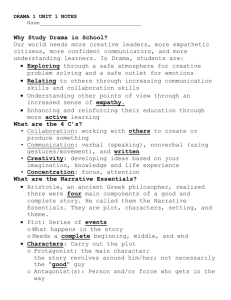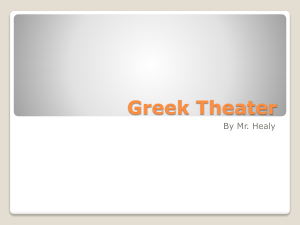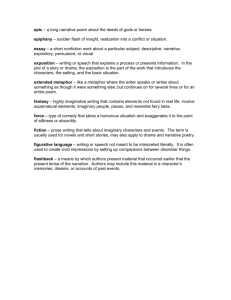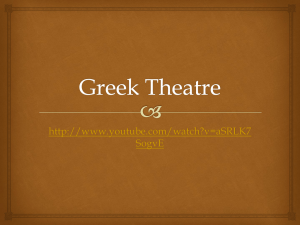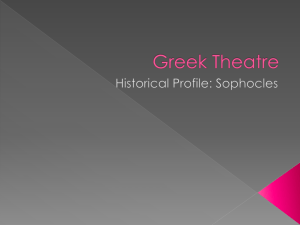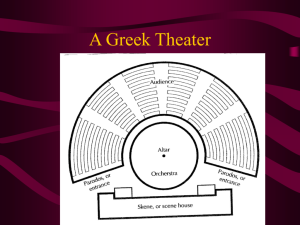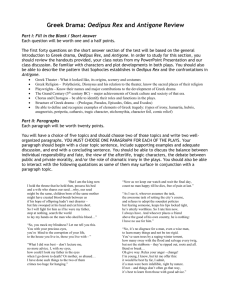File
advertisement
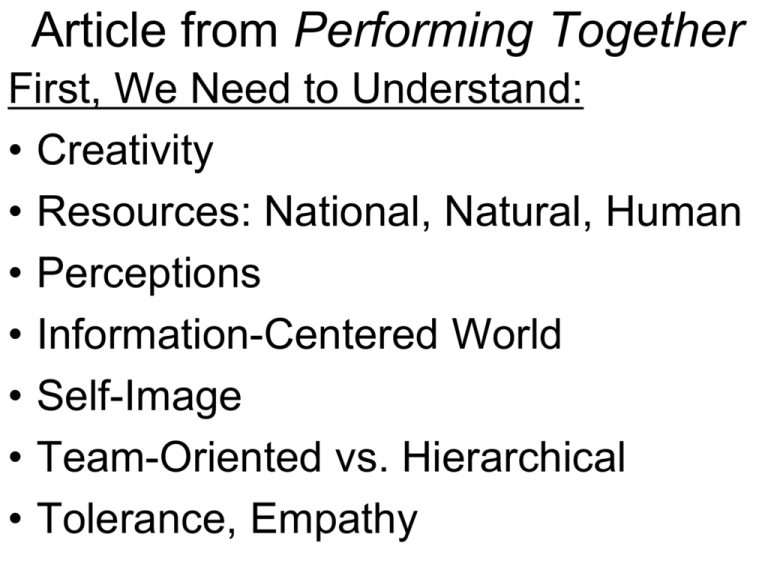
Article from Performing Together First, We Need to Understand: • Creativity • Resources: National, Natural, Human • Perceptions • Information-Centered World • Self-Image • Team-Oriented vs. Hierarchical • Tolerance, Empathy Article from Performing Together • • • • • • • • Polarized, Intolerant Global Citizens Intrinsic Kinesthetic Intellectual Retention Traditional Academics Dramatic Arts Education Article from Performing Together We are reading this article to answer the question: According to Matt Buchanan, why do we study Drama in school? As we read: •Underline, highlight, circle words/phrases you think are related to Web Diagrams Health Low in Calorie s Boosts Metabol - ism Antioxidants Benefits of Drinking Coffee Comforting Tastes good Smells nice Gives energy in morning Caffeine Pull “all Nighters” Stay awake in boring Iced for meetings hot days Somethin g for each Hot for season cold days Pumpkin in Fall Working with the Article In your groups (your desk cluster), create a web diagram outlining the answer to the question: According to Matt Buchanan, why do we study Drama in school? At the center, you should have “Drama in Schools” or something similar. *You can move desks a little, but they Why do we study Drama in school? Exploring • Creative Problem Solving • Challenging Perceptions • Outlet • Safe Relating • Communicating • Public Speaking • More Persuasive • More Confident Self-Image • Collaborating Why do we study Drama in Enhancing/Reinfo school? Understanding rcing • Tolerance and • Reinforces other school Empathy • Understanding curriculum other points of • Understand history/ current view events, i.e. • Responsible Global Citizens human interactions Taking Notes, etc. • I try to make them go really quickly, but there is info you just have to know before we can get on our feet and work with it. • Usually fill in the blank with PowerPoint as a guide. • If we take notes on it, you are responsible for the information— usually in the form of a quiz. • I try to give enough time for everyone Why Study Drama in School? Our world needs more creative leaders, more empathetic citizens, more confident communicators, and more understanding learners. In Drama, students are: • Exploring through a safe atmosphere for creative problem solving and a safe outlet for emotions Why Study Drama in School? • Relating to others through increasing communication skills and collaboration skills • Understanding other points of view through an increased sense of empathy. • Enhancing and reinforcing their education through more active learning 4 C’s: The Foundation of Drama • Collaboration: working with others to create or produce something • Communication: verbal (speaking), nonverbal (using gestures/movement), and written • Creativity: developing ideas based on your imagination, knowledge and life experience • Concentration: focus, attention The Narrative Essentials • What are the Narrative Essentials? • Aristotle, an ancient Greek philosopher, realized there were four main components of a good and complete story. He called them the Narrative Essentials. They are plot, characters, setting, and theme. The Narrative Essentials • Plot: Series of events – What happens in the story – Needs a complete beginning, middle, and end • Characters: Carry out the plot – Protagonist: the main character; the story revolves around him/her; not necessarily the “good” guy – Antagonist(s): Person and/or force who gets in the way The Narrative Essentials • Theme: The message or point of the story • Setting – Location – Time period (historical context) – Time of day/time of year – Mood/Atmosphere The Narrative Essentials Why are the Narrative Essentials Important? • Drama is the art of writing and producing plays, and plays, just like books or movies, are a form of storytelling • In order for us to write and perform stories well, we have to know what makes up a good and complete story, i.e. the Narrative Essentials Rehearsal Time • Make sure you understand all instructions given. • Stay focused on the task at hand. – Keep conversation on topic. – Stay with your group—even if your group is “done.” Rehearsal Time • Practice the words & the movement. Don’t just talk about what you’ll do, actually practice doing it that way. • Run through it multiple times to make sure everyone remembers what they’re doing/saying. • If you think you’re done, run through it one more time. Overcoming Stage Fright • Be Prepared: Rehearse! • Get Focused: Breathe, have good posture, and find a focal point. • Stay Focused: Listen to your scene partners, not the audience. Anticipate your lines. • Don’t be too hard on yourself: The more you perform, the easier it becomes. Good Audience Etiquette • Focus your attention on the performance. • Don’t talk or make any other unnecessary noise. • Don’t get up and/or move around. • Don’t text or use other electronic devices. • Above all else, don’t take attention away from the performance onstage. Giving Critiques • Ask yourself, “Is my comment going to be helpful for the performers?” Be respectful!! • Don’t just focus on negative things. Make sure to tell people what they’re doing well, too. • Be specific about what they did well or what they could work on. Giving Critiques • Offer suggestions to help when you think there’s something to be fixed. • If being critiqued: Don’t get offended if someone tells you something to work on. We all have room to grow! • NOTE: People are allowed to be offended if critiques are unkind. It’s a two-way street, so to speak. Narrative Essentials Practice • Plot • Characters – Protagonist – Antagonist(s) • Setting – – – – Location Time Period Time of Day/Season Mood/Atmosphere • Theme Narrative Essential Practice • With your partner, read a short play • Discuss the play together • Complete the Narrative Essentials worksheet together Story Retelling Assignment • Assigned to small groups • Select a story from a hat. If your group does not know the story, you can rechoose. *DO NOT TELL OTHER GROUPS* • Group should outline the Narrative Essentials on 1 sheet of paper. • Discuss how to “stage” the story • Rehearse the story • Perform for the class • Complete critique cards Historic Periods of Theater Time How it Period Started Performance spaces Actors Make-up/ costume Other Greek 6th century BC (600500 BC) Started as choral odes; Worship of the god Dionysus Started as large simple circle— orchestra Women not allowed to perform; Thespis was first actor Masks— expressive, megaphone Foundation of Renaissance 16th Century (1500-1600) First theatre in 1576 Transition from religious to secular entertain-ment England: First in inns, etc. then moved into actual theatres; usually circular; Italy: developed proscenium arch & backdrops England: All men; formed guilds Italy: First female actors England: used costumes Italy: used masks England: William Shakes. Italy: Commedia dell’Arte Kabuki Japan, 17th Century (Early 1600s) Still today Based on legends; involves singing and dancing Raised platforms with a curtain All male Masks, artificial casts make-up; extravagant and colorful European (Western) Theatre Little influence on West; more symbolic Part Two: Short Answer 1. Greek theatre began in the 5th century BC in Athens, Greece (hold on! The other website says 6th century! Whaaaat? It was a process…some people date it earlier. Just know that it was 600400 BC) 2. Dionysus, Greek god of wine, harvest, and fertility Part Two: Short Answer 3. Sophocles was a famous Greek playwright. 4. There were 3 main types of plays: – Tragedies: character suffers disastrous end – Comedies: always had a happy ending – Satires: made fun of mortal legends and real people Part Two: Short Answer 5. Thespis was the first actor; in his honor actors are called thespians. (He was the first actor because he was the first person to step out of the chorus and speak by himself.) 6. VIP seating area; chorus is group singing and dancing; masks make the characters more obvious and help project the voice; crane was used to lift an actor up—usually a god coming in to solve the problem in the play; three types of costumes for each type of play; acting started as chorus leader speaking to chorus, then they added a 2nd and 3rd character, etc. Parts of the Greek Stage • Orchestra: the performance (singing, dancing, acting) area; altar at the center • Skene: building behind stage; decorated according to setting of play; could be used for entrances/exits • Theatron: where the audience sat; usually part of a hillside • Parados: used for actor exit/entrance as well as audience entrances/exits Videos • Ancient Greek: the stage, trad chorus, modern interpretation • Shakespeare (English Renaissance) shake in love clip • Commedia Dell’Arte (Italian Renaissance) stock characters • Kabuki intro, performance Geography Greek civilization started around 2000 BC and lasted until about 100 BC. The country of Greece is located in the southeastern part of the continent of Europe. Greece is a peninsula surrounded by the Mediterranean, Ionian & Aegean Sea. Culture Because of Greece’s location, travel & trade by sea became very common. Ancient Greece was composed not of one large empire, but many citystates. While everyone living in a city-state was Greek, each place had its own unique beliefs and culture. Politics Between the 700s and 400s BC, the Athenians developed a new form of government called democracy. Democracy put the decisions about how things were ruled in the hands of the people. The development of democracy in Greece was very important since it has been copied in many Western nations. Philosophy The foundation for Western thought Make order out of chaos Socrates Thinking better through always asking more and more questions Plato Ideal forms Wrote Poetics which still influences the way we view art today Aristotle Basis for scientific method Narrative Essentials Religion The ancient Greeks were polytheistic and therefore worshiped many gods. The twelve most important gods formed a group called the pantheon. Each god was responsible for a different aspect of nature or Greek life. God/Goddess God of What? Symbol Zeus Master of the gods Lightning bolts Hera (Zeus’ Wife) Women, Fertility Pomegranate Ares War Spear, Helmet Aphrodite Love, Beauty Swan, Dove Athena Wisdom Owl Poseidon Sea Trident Demeter Harvest Bundle of grain Hephaestus Blacksmiths Hammer, Anvil Artemis Hunting, Moon Animal pelts Dionysus Wine, parties, theatre Grapes, Vines Apollo Music, archery Sun, bow/arrow Hestia Home Hearth Hermes Messenger of gods Winged sandals Hades Underworld Scepter Plays were performed in Ancient Greece to honour the Dionysus, the god of theatre and wine. A goat was sacrificed and the chorus danced around the altar and chanted. These chants evolved into dramatic contests. Thespis is said to have won the first contest. Dionysus Greek theatres Greek theatres were large and semi-circular, with rows of tiered seating. The centre was circular with an altar dedicated to Dionysus. The stage was raised within the circle – this shape made sure all the audience could see and helped amplify the sound. Theatron Orchestra Altar Parados Skene Parts of a Greek Theater Acting Chorus: group of actors chanting in unison Thespis: the first known actor to step out of the chorus (“thespian,” i.e. actor, comes from his name) Wore big shoes and masks to help with the problem of distance from the acting space to the audience. Masks Masks exaggerated to fit the character; bright colors for comedies and dark colors for tragedies. Megaphone type devices in some of the masks You could see if someone was happy or sad by the shape of their mask. Women could attend the plays, but all the actors were men (even playing the parts of women). The audience would throw food and stones if they thought the acting wasn’t good enough! Three types: tragedies, comedies, & satyr plays. The plays Sophocles & the Theban Plays Sophocles wrote tragedies. Famous for the Theban Plays: Oedipus the King Oedipus at Colonus Antigone About fate & human vs. divine laws
